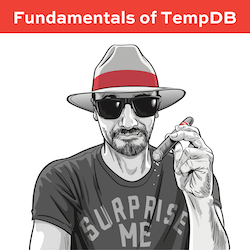 You’ve been working with Microsoft SQL Server for a couple of years, and you know a little bit about TempDB. You’ve heard that temp tables and table variables have different performance characteristics than regular user database tables, and you’ve heard that you’re supposed to have multiple data files.
You’ve been working with Microsoft SQL Server for a couple of years, and you know a little bit about TempDB. You’ve heard that temp tables and table variables have different performance characteristics than regular user database tables, and you’ve heard that you’re supposed to have multiple data files.
You’re wondering what exactly goes on behind the scenes.
This class is for curious folks who want to learn:
- What uses TempDB, and how that affects performance: not just temp tables and table variables, but also triggers, cursors, sorting indexes, workspace spills, the version store, and more
- How to host TempDB depending on how you use it: understanding what goes in the log file, the data files, why the number of data files matter, and whether your particular workload should be on SAN, local storage, or ephemeral storage, and why
- How to monitor it: after you understand what uses it and how to host it, you need to keep tabs on how its performance changes over time using DMVs, Perfmon counters, and the First Responder Kit scripts
This course is 90% demos: the only slides are the introductions at the start of the day, illustrations to support a few topics, and the recap at the end of the day. The rest of the time, we’ll be working in SQL Server Management Studio. Roll up your sleeves and join me!
No registration required – just add this event to your calendar, then show up at BrentOzar.com/training/live/ on next Monday at 8AM UTC. This is a Europe-friendly time zone class – folks in other parts of the world will either need to get up at an oddball time, or else buy the recordings.
If you’d like to follow along with the demos during class – totally optional, not required – you’ll need a SQL Server 2016 or newer instance. Your server’s power doesn’t really matter – you can run this class’s labs on your local desktop just fine as long as you’ve got enough space for the database. I will show you the differences in SQL Server 2019, but if you’re not using 2019 yet, no worries – you can just watch those portions of the demos. You’ll also need any Stack Overflow database. In the class, I’ll be using the 50GB StackOverflow2013 version, but any version/size will work.
See you in class!


1 Comment. Leave new
Excellent